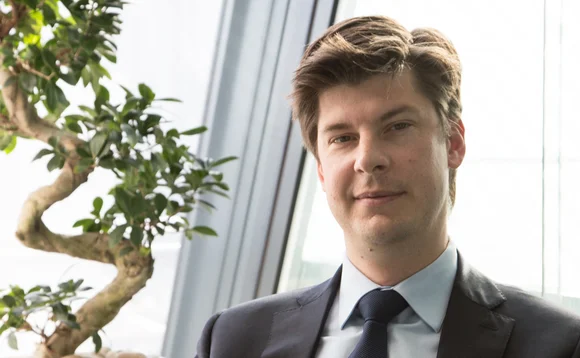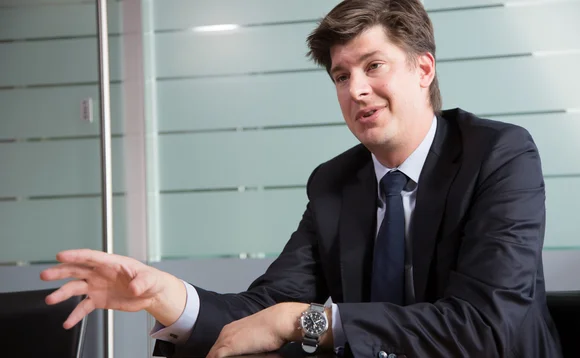Think Different, Be Different: Thomas Biotteau, Kepler Cheuvreux






It is in the middle of a storm that you can judge the stability of things. The history of Kepler Cheuvreux consists of ups and downs, from large mergers and strategic acquisitions to a management buy-out after filing for bankruptcy. But stability is the quality that best describes the firm.
Thomas Biotteau, Kepler Cheuvreux’s head of electronic execution services, has spent most of his career working for the firm’s various entities, from the Julius Baer Brokerage to its most recent incarnation, Kepler Cheuvreux, and has always thought that the firm would grow to be a large broker.
Born from Julius Baer’s brokerage business, the firm that would become Kepler Equities was spun off from the Swiss private banking group in 2003 and sold to Lightyear Capital, a US private equity firm. Two years later, the Icelandic commercial bank Landsbanki bought Kepler Equities in order to grow its inter-dealer brokerage activities, before the bank itself succumbed to the global financial crisis and collapsed in 2008. The Icelandic government assumed control of Landsbanki in October of that year, and some two months later, Kepler Capital Markets was sold to the firm’s management and employees through a management-led buy-out.
During the four following years, the firm struck a number of partnerships and strategic alliances. New shareholders were brought on board, including BlackFin Capital Partners, la Caisse des Dépôts, Gruppo Banca Leonardo, and Crédit Mutuel Arkéa. Kepler Capital Markets acquired part of Banca Leonardo’s brokerage business and reinforced its Italian presence with an alliance with UniCredit. Negotiations with Crédit Agricole Cheuvreux started in July 2012, with the resulting acquisition completed in May the following year.
Biotteau was part of it all. He started as a consultant at Julius Baer, where he was tasked with the implementation of the bank’s research platform. Two years later, he was asked to build a direct market access (DMA) platform at the bank, and has since made significant headway up the corporate ladder. Biotteau has the assertiveness and confidence of a business executive well beyond his 38 years. For him, the collapse of Landsbanki was the worst thing he and his team had ever had to contend with, although making it through that crisis has been one of the greatest lessons.
“It was clearly a challenge, but we made it through the adversity, and because we are experienced in working under such pressure, we can say that we now have a very strong business case. We were willing to think differently and I think that is where the value of Kepler lies,” Biotteau says.
The fight to keep Kepler Capital Markets afloat during the most difficult years in recent memory was hard, but for Biotteau, it is what allowed the firm to build strong and stable bases in preparation for the 2013 merger with Crédit Agricole Cheuvreux, which resulted in the creation of the large European equities brokerage.
“If you want to be successful in this business today, you need to be big,” Biotteau says. “There is greater concentration because of decreased margins, and in order to survive, you need to be big and to offer services that others don’t.”
Growing Bigger
A year-and-a-half after the merger, Biotteau says he looks back on it with satisfaction. He knows the right choices were made, which sets the firm up for more growth and possibly even further acquisitions.
“The merger was challenging in terms of technology and project management,” he says. “The most difficult part, however, was not the technology per se, but defining our technology strategy. Kepler was in favor of outsourcing some functionality and focusing on the core business, while Cheuvreux was more in favor of internalizing almost everything and developing everything in-house.”
Cheuvreux’s technology strategy was hugely expensive, which Biotteau says meant it was unable to adapt to changing markets, which is a necessity. For him, flexibility is key, especially when market conditions evolve as fast as currently are, in such a cyclical manner.
Ultimately, the decision was made not to merge the two platforms, but to follow the Kepler preference of using external providers such as SunGard for market access and smart order routing, Ullink for the firm’s FIX engine, and FlexTrade to take care of its algorithm needs.
Growing Stronger
The Cheuvreux infrastructure was dismantled in the wake of the merger, while Kepler’s platform was enhanced through carefully chosen outsourced software. Every area where the firm thought its team couldn’t add value was externalized.
“Why would I develop an algo engine to receive market data and trade on the market when there are a lot of providers out there that already do that and are more experienced at it than me? So we bought the software and we focused on doing the proprietary source code on this platform,” he says. “The same applies to market data. Will I make a significant improvement in doing my own market data decoder? I don’t think so. I could probably be faster, but at what cost?”
Within six months, Kepler’s old platform was enhanced from front- to back-office, to boost its processing capabilities—up to tenfold higher than its original capacity—in order to accommodate the order flow coming from Cheuvreux and prospective clients. The firm even invested in two new datacenters based in Paris—Telecity and Telehouse—to ensure the resiliency of the new platform.
The new structure is more flexible and adaptive than the Cheuvreux platform ever would have been, although Biotteau says that some functionality and software that was developed in-house at Cheuvreux was so good that it has been re-integrated into the new platform. Nothing is lost, nothing is created, and yet everything is transformed, says Biotteau.
The Kepler Cheuvreux Universe
The culture at Kepler Cheuvreux, mostly inherited from Kepler’s turbulent past, is different in that most of the management owns a part of the business and all have carried the firm through its darkest days, bringing it to where it is today. Biotteau himself was part of the management buy-out, and says he believes this is a strength that Kepler brought to the new entity. The goal of the merger was to create a European leader in local brokerage by combining Cheuvreux’s knowledge and expertise in equities with Kepler’s resilience and management.
“The size of the team has changed and therefore our ambitions have changed too,” Biotteau explains. “We are a lot bigger than we used to be at Kepler and although the two companies were similar, Cheuvreux was much bigger on the equities side, while Kepler was smaller but more diversified. Today, we are striving to be a big but diversified player.”
In this marriage, technology is the cement binding the two partners together. For Biotteau, the merger was made possible thanks to the minds of technologists who knew that although it would be challenging, the end goal was achievable. He says technologists should be deeply involved in firms’ strategy, given that financial services firms are now evolving in an IT world, rather than the other way round.
“It is important to have someone with a technology background in charge of execution because it’s an IT world, and you need to make decisions and lead projects that are technologically feasible,” he says. “We are talking about algos, electronic workflow, market access, and so on. All of this is technology-enabled.”
Algo Performance and Stability
Now that the merger is complete and the new firm is striving to compete in the European brokerage world, Biotteau is able to return to his initial remit—electronic execution services. Kepler Cheuvreux’s algorithms are Biotteau’s pride, and his job is to ensure their performance and stability.
“We don’t pretend to have the best algos in the world, but we have some very good ones that are specific and stable and that’s what we aspire to do,” he says. “My number one task is stability. There is nothing worse for me than an algo that does not perform as predicted. We make sure our algos always perform in their average range, even if there are sudden market movements. We put the right performance measurement in place to understand and analyze where and when our algos perform well or not.”
Kepler Cheuvreux is investing time and resources in improving its algos because that’s where Biotteau says it can make a difference. The firm started working on algo development in the early 2000s. Today, their performance is measured according to nine criteria: spread, order value, participation, duration, momentum, volatility, aggressiveness, market imbalance and stock resilience.
“We invest as much on the control of the algo as we do on its production,” Biotteau says. “We have a lot of internal controls within an algo that guarantee that it won’t trade above or below its benchmark. We also have systems in place to prevent them from sending incorrect orders into the market.”
Think Differently
Biotteau’s motto is never stop thinking differently, do things in a different way, and don’t be scared to move in the opposite direction. Recently, he started looking at developments around latency with the view to implementing a new strategy in this area.
“While everyone is trying to reduce latency to a bare minimum, why not look at increasing it? In some cases, increasing latency could disturb the high-frequency trading arbitrage in front of you, which could be interesting,” Biotteau says. “At the very least, we need to consider the idea because that’s also part of our commitment to thinking differently.”
This could increase the predictability of the firm’s algorithms and the timing around market data, but it is also a risky move, which would be what keeps him awake at night if his six-month-old baby wasn’t already doing so. Biotteau notes that this idea is only a thought he threw at the firm’s quant team, who will dissect it and decide if it is worth pursuing or not.
Biotteau also spends a lot of time mulling over the ins and outs of transaction-cost analysis (TCA). The firm has several projects under way that it runs in conjunction with its quantitative research group and London-based market data research and execution quality services provider LiquidMetrix, to find better ways of analyzing the performance of its algos and to generate a better understanding of the venues they post orders to.
But to do so, Biotteau needs to be able to understand his firm’s own market impact and the market impact of the trades it executes. He already knows he will be using a tool from LiquidMetrix to help him learn more about his algorithms in order to better understand the way Kepler Cheuvreux posts orders, and, more importantly, where it should be posting its orders from a best execution perspective.
That should keep him busy until the next merger.
FUNDAMENTAL DATA
Name: Thomas Biotteau
Born: France
Title: Head of electronic execution services, Kepler Cheuvreux
Education: Studied engineering in France
Hobbies: Traveling and meeting with friends and family
Greatest Lesson Learned: “If every time you want to implement something you are too worried about the consequences, you will never do anything. You need to be aware of the consequences, because there is an inherent risk in all decisions you make. The importance is to move ahead in a controlled way—not too fast, but you must be moving; otherwise, you won’t do anything and your competitors will make the move.”
Technology Successes: “In terms of the stability of our algorithms, I think we are now one step ahead of where Cheuvreux was, which is a good achievement. I am talking about the algo framework, but also about their functionality and our client orientation. We are more client-oriented and more flexible than they used to be at Cheuvreux, allowing us to make evolutionary changes to the current version of our algos.”
Technology Under Evaluation: “We are currently looking at latency. We wanted to think differently about that so we looked at the possibility of increasing latency, especially for algorithms—not in terms of our capacity to access the market, because there we need to reduce it. But do we need to react with the lowest latency possible for every algorithm? I don’t think so.”
Only users who have a paid subscription or are part of a corporate subscription are able to print or copy content.
To access these options, along with all other subscription benefits, please contact info@waterstechnology.com or view our subscription options here: https://subscriptions.waterstechnology.com/subscribe
You are currently unable to print this content. Please contact info@waterstechnology.com to find out more.
You are currently unable to copy this content. Please contact info@waterstechnology.com to find out more.
Copyright Infopro Digital Limited. All rights reserved.
As outlined in our terms and conditions, https://www.infopro-digital.com/terms-and-conditions/subscriptions/ (point 2.4), printing is limited to a single copy.
If you would like to purchase additional rights please email info@waterstechnology.com
Copyright Infopro Digital Limited. All rights reserved.
You may share this content using our article tools. As outlined in our terms and conditions, https://www.infopro-digital.com/terms-and-conditions/subscriptions/ (clause 2.4), an Authorised User may only make one copy of the materials for their own personal use. You must also comply with the restrictions in clause 2.5.
If you would like to purchase additional rights please email info@waterstechnology.com
More on Emerging Technologies
Data standardization is the ‘trust accelerator’ for broader AI adoption
In this guest column, data product managers at Fitch Solutions explain AI’s impact on credit and investment risk management.
BNY inks AI deal with Google, Broadridge moves proxy voting to AWS, Expero delivers ICE market data, and more
The Waters Cooler: TSX Venture Exchange data hits the blockchain, SmartTrade acquires Kace, and garage doors link to cloud costs in this week’s news roundup.
Everyone wants to tokenize the assets. What about the data?
The IMD Wrap: With exchanges moving market data on-chain, Wei-Shen believes there’s a need to standardize licensing agreements.
Google, CME say they’ve proved cloud can support HFT—now what?
After demonstrating in September that ultra-low-latency trading can be facilitated in the cloud, the exchange and tech giant are hoping to see barriers to entry come down.
Waters Wavelength Ep. 342: LexisNexis Risk Solutions’ Sophie Lagouanelle
This week, Sophie Lagouanelle, chief product officer for financial crime compliance at LNRS, joins the podcast to discuss trends in the space moving into 2026.
Citadel Securities, BlackRock, Nasdaq mull tokenized equities’ impact on regulations
An SEC panel of broker-dealers, market-makers and crypto specialists debated the ramifications of a future with tokenized equities.
BlackRock and AccessFintech partner, LSEG collabs with OpenAI, Apex launches Pisces service, and more
The Waters Cooler: CJC launches MDC service, Centreon secures Sixth Street investment, UK bond CT update, and more in this week’s news roundup.
Tokenized assets draw interest, but regulation lags behind
Regulators around the globe are showing increased interest in tokenization, but concretely identifying and implementing guardrails and ground rules for tokenized products has remained slow.







